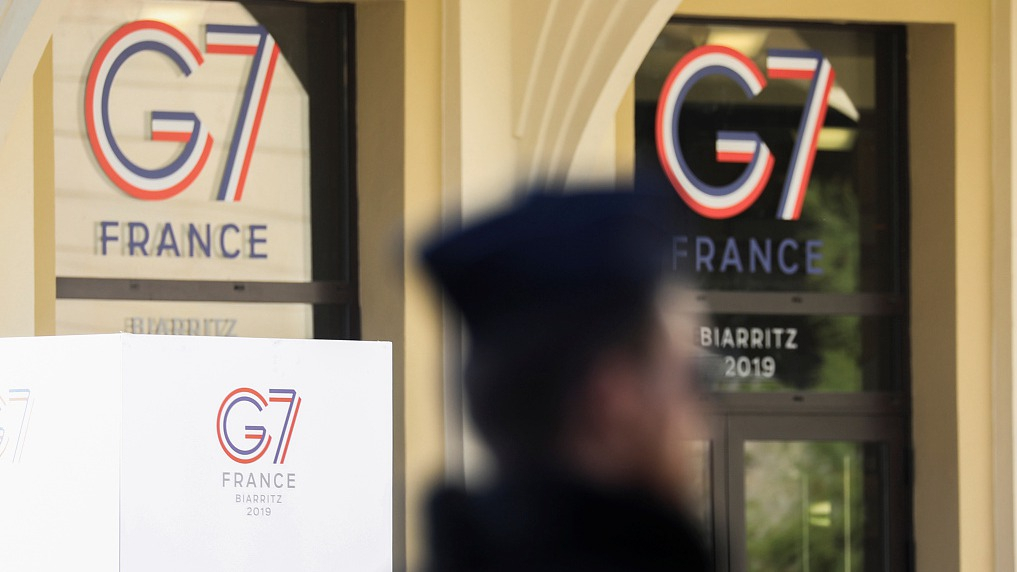

Editor's note: Andrew Korybko is a Moscow-based American political analyst. The article reflects the author's opinions, and not necessarily the views of CGTN.
World leaders are gathering in the French seaside town of Biarritz for this year's G7 summit. U.S. President Donald Trump, Russia and China are expected to top the agenda.
The U.S. president's unilateralism, especially in the trade and tariff spheres, has disrupted the global economy and even exacerbated fault lines between members of the group. It's of the highest priority that the attendees try to work out a grand compromise with him that stabilizes the situation and results in a degree of predictability during these turbulent economic times.
Meanwhile, Russian President Vladimir Putin recently met with his French counterpart for a very productive meeting that saw Emmanuel Macron reaffirm his willingness to help broker a rapprochement between Moscow and the West, one that Trump seemed interested enough in.
This confirms the trend of a general warming of relations between the two sides that's been in effect since U.S. National Security Adviser Bolton's visit to Sochi in May, when Putin expressed his eagerness to improve ties.
The G7 members are divided over their approach to China. Washington's economic hostilities against Beijing are well known, as are its efforts to pressure its allies to follow suit on supposed "national security" grounds, first by curtailing Huawei's activities in their countries and then potentially enacting their own tariffs against it as well.
Trump wants to reroute the global supply chain away from China, but he'll only isolate his own country unless other important ones fall under his influence and do so too.
Considering these three prevailing themes of the ongoing summit, it can be said that while the event naturally concerns economic issues, there's also a very crucial geopolitical component at play because the two are sometimes intertwined, as in this instance.
It's impossible to analyze Trump's economic moves, both tariffs and his overall stance towards China, without addressing the political motives behind them, which are all about decelerating the decline of the U.S. share of the global economy.

Special police officers of the G7 summit guard the hotel where the members of the summit will carry out all the scheduled events in Biarritz, France, August 22, 2019. /VCG Photo
It's conventional knowledge that the U.S. no longer commands the dominant economic presence that it used to immediately after the Second World War, though that of course doesn't mean that it's irrelevant or will become so anytime soon.
Still, Trump believes that globalization is responsible for this trend since it resulted in the offshoring of a lot of its production capabilities and consequently empowered the economies of other countries. That's the main reason why he's cracking down so much on free trade through his tariffs.
Russia figures into this strategy by the fact that it's perfectly positioned to profit off of East-West trade between China and the EU via the Eurasian Land Bridge, which is the most direct overland trade route between the two out of all the other Silk Road projects being pursued.
The U.S. realizes that it isolated itself and its allies from taking advantage of this through the anti-Russian sanctions that it promulgated and later forced upon them too, which is why it's rethinking the wisdom of this approach by reconsidering Moscow's return to the G7.
Concerning China, it's important to note that Indian Prime Minister Narendra Modi received a special invitation to attend the summit. He's been doing his best to promote his "Make In India" vision of becoming a global production powerhouse, which in the contemporary context perfectly complements what the U.S. is trying to do by encouraging the "re-offshoring" of production from China to elsewhere in Asia.
That's not to imply that India has any hostile intentions against China, but just that the U.S. will almost certainly try to exploit it to this end.
Therefore, this weekend's G7 summit is an important event for observers to follow. The interconnected dynamics between Trump, Russia and China will figure prominently on the agenda, whether formally or informally.
The main trend is that the U.S. will try to pressure its partners into adopting its agenda on everything, though some of them such as Germany might continue to resist out of the expectation that Trump might lose his re-election bid and everything might go back to normal by the end of next year.
(If you want to contribute and have specific expertise, please contact us at opinions@cgtn.com.)

Copyright © 2018 CGTN. Beijing ICP prepared NO.16065310-3
Copyright © 2018 CGTN. Beijing ICP prepared NO.16065310-3